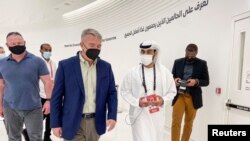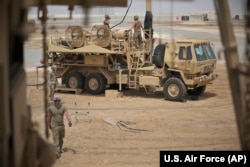The U.S. military is stepping up support to the United Arab Emirates after a series of missile and drone attacks launched by Yemen’s Houthi rebels. U.S. General Frank McKenzie, head of the U.S. Central Command overseeing American forces in the Middle East, has been in the UAE to bolster defenses. Analysts say the attacks on the Gulf nation could hurt its reputation as a stable business and tourist hub with tough security.
Speaking from the United Arab Emirates, U.S. General Frank McKenzie said battlefield setbacks in Yemen by Iran-backed Houthi rebels may have prompted recent attacks on the UAE capital, Abu Dhabi, where a military base also hosts U.S. troops. The seven-year Yemen war has pit Houthis against government forces backed by Saudi Arabia and an Arab coalition, including the UAE. The conflict, viewed as a proxy war involving Iran, has killed tens of thousands of Yemenis, sparking one of the world’s worst humanitarian crises.
U.S. and United Nations officials have documented Iran smuggling high-end weapons to the Houthis. "Medium range ballistic missiles that were fired from Yemen and entered UAE were not invented, built, designed in Yemen," McKenzie said. So, I think we certainly see the Iranian connection to this."
Giuseppe Dentice heads the Middle East desk at Rome’s Center for International Studies. He told VOA that the Houthis are using the attacks to leverage their demands.
"It’s a strong and symbolic sign that shows how no one in the Gulf is safe and the Houthis have the ability to hit all these countries in the area. Maybe the main risk is the growing internationalization of the conflict with a widening front of new players; for instance, Israel that is interested to support Abu Dhabi to confront Iran in any scenario of this crisis. These attacks aim to weaken the security of the commercial, tourism, (and) financial hub in the Gulf," he said.
Dr. Andreas Krieg, an associate professor at the School of Security at King's College in London, agrees that the Houthi attacks pose a menace to the UAE's standing as the key commercial and tourism hub in the Gulf and could hurt its safe reputation for finance and security.
“This is a major reputational damage to the idea of the UAE being one of the safest and more secure countries in the world,” Krieg told The New Arab online publication. “The fact that air defenses were unable to protect very critical infrastructure is definitely something the UAE will now have to consider,” he said.
Until recently, the UAE had been immune from such outright missile and drone attacks that the Houthis have rained down on neighboring Saudi Arabia.
The Pentagon says advanced F-22 fighter jets are being sent to the UAE and a guided missile destroyer, the USS Cole, will aid its navy to surveil Gulf waters for shipments of contraband. U.S. President Joe Biden says Washington is considering re-designating the Houthis as an international terrorist organization, a label which was rescinded last February. The UAE has called for the designation to be restored.





